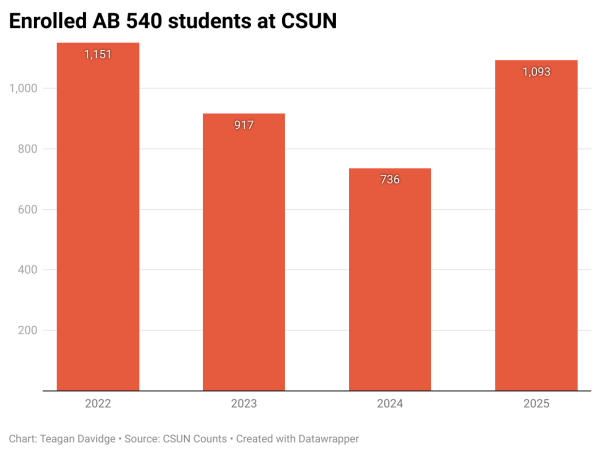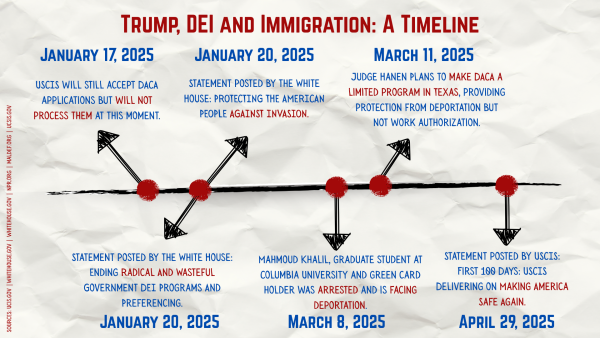“We are the target”: Immigrant Matadors on edge
Jazmin Garcia Gaspar should be celebrating having completed her freshman year at California State University, Northridge, on a full-ride scholarship. But unable to afford college tuition due to her father’s deportation, she is afraid her first year might be her last.
“My mom has been worried that my program is going to be shut down, especially because that’s the only reason I’m in college,” said Garcia Gaspar, a Bridge to the Future Scholar. “I do have a lot of worry in my day-to-day life, thinking if my program’s going to get shut down. And if it does, I feel like I’m going to have to drop out.”
Garcia Gaspar is not the only one who has to face repressive barriers that affect her college career. The uncertainty that comes with family separation, deportation and elimination of Diversity, Equity and Inclusion programs is pervasive on campus.
More than half of CSUN students are the first in their family to attend college, and many come from immigrant families. According to CSUN, the university also has a high undocumented student population, making up about 6% of the student body. More than 1,100 students were enrolled under AB 540 qualification in the spring semester, ensuring eligibility for in-state tuition despite not being U.S. citizens or legal residents.

“There’s anxiety, there’s uncertainty, it feels like there’s just so many moving pieces. It’s hard to know what’s legal one day, what’s going to be illegal the next,” said CSUN Assistant Professor of Elementary Education Alexandria Hollett.
The Trump administration is attempting to eliminate DEI programs, which it describes as “radical” and “wasteful.” Another executive order threatened noncompliant universities and school districts with a removal of federal funding.
A New Hampshire judge blocked the order on April 24, 2025, citing the vagueness around what a DEI program is and Trump’s lack of authority to make such sweeping changes. It’s unclear what would happen if it moves to the Supreme Court.
Additionally, concerns have arisen for many immigrants across the U.S. following a number of governmental crackdowns on immigration. U.S. Immigration and Customs Enforcement Removal Statistics states that more than 71,400 ICE removals have taken place in the fiscal year 2025.

Even in spaces that have been created to help immigrant students and their families, fear seeps in.
“There’s a lot of uncertainty. There’s a lot of fear,” said Irvin Rendon, CSUN’s DREAM Center manager. “People are scared. They don’t know where they are safe.”
The University Student Union’s center is the primary location for students of non-citizen status to build community and access important resources. However, governmental policies have impeded on that space.
“Students who might have come to the center more regularly have stopped doing that, but they still attend the programs and events. Being in this space when there’s not a program might bring negative attention to them, and that’s where some of their fear stems from,” said Rendon.
The center offers events like “The Right to Travel for Non-Citizens: Updates on Advance Parole and Domestic Travel,” and “Undocumented Student Ally Training,” with the goal of keeping students up to date on immigration policy changes.
Although many students are able to acquire resources through the DREAM Center, they can’t help but still feel unsafe on campus. Some of their fear is due to the university’s president not providing a statement on her allyship with the undocumented community.
Some CSUN students, despite being citizens themselves, are burdened by fears about their family members coming in contact with immigration officers while away at school.
“I feel like it makes me super anxious when my family that’s undocumented go to work or anything, because anything—a traffic stop or any interaction with police—kind of scares me, and they’re extremely scared too,” said Giuliana Melgar, a fourth-year journalism student.
Melgar’s younger cousins have also faced obstacles entering higher education due to their parents’ immigration statuses.
The Free Application for Federal Student Aid supplied students with $114.9 billion in grants and loans last year, which enabled many of these students to attend college. However, with ICE making agreements with the IRS, even filling out the FAFSA is a safety risk.
“That could greatly impact whether they go to college or not, which is really devastating,” Melgar said.
Along with consistent, updated information on CSUN’s campus related to immigration topics, the DREAM Center offers legal services to all faculty, staff, students and their immediate families through CARECEN’s College Legal Services. Alumni can also receive services up to two years after graduating.
“Our CLS Team offers removal defense services for CSU students only. We will handle this case by case, however, if we are unable to provide these services through the College Legal Services team, we can refer the case to another department within CARECEN.” said Celeste Concha, a college paralegal from CARECEN.
Professor Hollett recently volunteered to assist in hosting a “Know Your Rights” training for CSUN students in the College of Education. The event was held in the wake of Los Angeles Unified School District encounters with agents of the Department of Homeland Security and ICE.
Hollett explained that while training events are crucial to ensure the protection of students in all grade levels, the reactions and responses of the university are only a pinpoint into an issue affecting students across the country.
“Most of what I’m seeing happen is responsive to the current moment, and it is a form of triage. We want to stop the bleeding, so to speak,” said Hollett. “Our campus is a microcosm of this broader conversation, but there’s a lot you can learn from just looking at CSUN.”
Despite similar anxieties echoing across campus, resilient students try their best to support each other.
“If we don’t stick together, then they’re the ones who are gonna win, which is unfair to all the hard working undocumented immigrants that are here paying taxes and they’re getting treated this way,” said Melgar. “The best thing we could do is hope and try not to live in that fear, because that’s exactly what they want.”
Latest Daily Sundial
- How AI Training Propels Students into Thriving CareersThe career landscape is a dynamic world where artificial intelligence (AI) is progressively rewriting the map. For today’s students, this is not only a task, but also a magnificent opportunity....
- Las Manzanas Famosas – A Sweet Story of Strength, Struggle and Self-Made SuccessIn the heart of the Northridge Fashion Center, tucked between bustling storefronts and familiar franchises, lies a small shop with a big heart—Famous Apples. Since 2019, the scent of warm...
- Review: Sinners brings the blues with a shade of redRyan Coogler’s latest film, ‘’Sinners,’’ dominated the box office upon its official release on April 17. Already a breakthrough film of the year, it sits at an outstanding 97% on...
- Review: Keni Titus, Pretty Sick and Beabadoobee at the Fox PomonaThe sparkly glowing red letters that spelled out “FOX” lit up the sky on a cloudy night, and the Fox Pomona Theatre marquee read: “Goldenvoice Presents Beabadoobee—4/17 SOLD OUT.” After...
- Review: ‘Fatal Fury: City of the Wolves’ burns bright in fighting gameplayFatal Fury: City of the Wolves (COTW) brings the heat with its fun to pick up, hard to master 1v1, 2D fighting gameplay and unforgettable characters. SNK provides their best...
- THPS Fest combines new Tony Hawk’s Pro Skater 3+4 details with electrifying live performancesThe Sundial was invited to THPS Fest, a fan event where Activision, AEG Presents and Goldenvoice invited guests and members of the press to the El Rey Theatre in Los...





